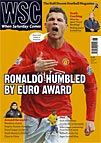 French football is in need of a financial facelift and, writes James Eastham, they've come up with a familiar looking scheme
French football is in need of a financial facelift and, writes James Eastham, they've come up with a familiar looking scheme
Raymond Domenech’s questionable managerial abilities made 2008 an awful year for France’s national team, but in November the state of the club game became the source of most navel-gazing tension, with the publication of the Besson Report. Written by politician Eric Besson and commissioned by national rugby coach-turned-sports minister Bernard Laporte, it was a seven-month study into how to make French football more competitive.
Increasingly poor results in Europe’s main competitions – no French side has progressed beyond the last 16 of the Champions League or the UEFA Cup in the past two seasons and none has reached the semi-finals since 2003-04 – have provoked panic and fury within the French football community. France is now almost certain to cede fourth place in UEFA’s rankings to Germany at the end of 2008-09, and emerging nations such as Russia and Romania are catching up, adding to the threat from Holland and Portugal. France’s best players continue to move abroad in great numbers, while the dull, low-scoring nature of many Ligue 1 matches, often played in half-empty stadiums, adds to the sense of despair.
Besson’s report makes a host of suggestions – and there are no prizes for guessing where he has looked for inspiration. At times his lengthy document reads like a homage to the Premier League. The phrase “modèle anglais” first appears in the introduction. “Task force” is used on page 149. In between, some of the financial excesses of the world’s glossiest league are detailed with a barely concealed awe. Many of the ideas he raises would be old-fashioned to an English audience, but to French ears, they’re fresh. They include finding new ways to part matchday fans from their money, reducing the share of income handed down from Ligue 1 to Ligue 2 and encouraging clubs to own their stadiums.
It sounds straightforward, but the historically egalitarian nature of French football means several steps will meet opposition. The French have always believed sport contains a public-service dimension, which is why the notion of “sport-business” has taken so long even to reach the stage where it’s discussed. Integrating economic practices that have been foreign, in every sense of the word, until now would risk damaging the roots of national game.
Yet a more pertinent question – one that Besson barely tackles – is: would the modèle anglais work anyway? Were France to usher in a new era of marketing, merchandising and hardcore money-making, would the customer base to make it viable exist? French supporters are hardly among the world’s most passionate or faithful, as Besson makes clear when he states only 61 per cent of French football fans, compared to 82 per cent in England and 93 per cent in Spain, follow a particular club. The idea that those that bother going to games (crowds are lower than in England, Spain or Germany) will fork out for logo-clad tat and overpriced bagels regularly enough to make such enterprises worthwhile seems far-fetched, to say the least. Besson mentions that Chelsea’s annual gate receipts are five times higher than Lyon’s even though the two clubs have comparable average attendances. I’d venture that, if Lyon president Jean-Michel Aulas were to hike Stade de Gerland prices to Stamford Bridge standards, he might find plenty of empty seats.
One area where Besson is spot on is stadium development. He calls the 1998 World Cup a missed opportunity, as all the money for that tournament was poured into the Stade de France. The result is that Ligue 1 is now played in crumbling grounds far from conducive to attracting “new” fans. In all, 21 new venues or redevelopments are planned across the country, with Besson favouring private money for many of those projects. He also backs the idea of sponsors paying to have venues named after them (“le naming”), with the first such deal having already been struck – Le Mans are set to move into their brand-new 25,000-seat MMArena (Mutuelles du Mans Assurances) next year.
The sums involved in that agreement, however, surely reveal the limitations of aping England. MMA will pay Le Mans just €1 million (£850,000) a year, which is a clear sign that Besson’s proposed revenue streams would constitute trickles rather than torrents. France’s desire to catch up with, or fend off, continental counterparts is perfectly understandable; but to do so, they may do better to invest in some original thinking.
From WSC 263 January 2009